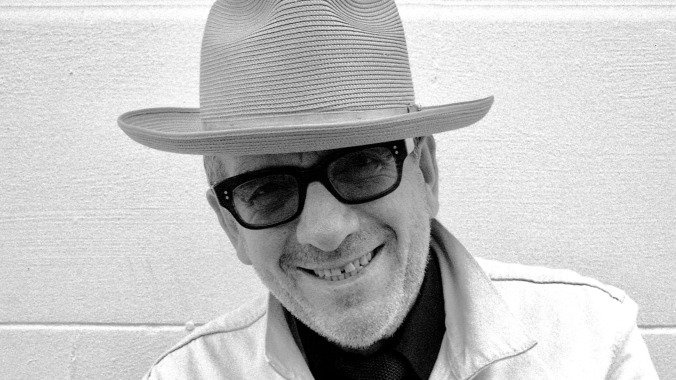From Elvis Costello to The Flatlanders: Pub-Rock and Americana’s Great Overlap
A Curmudgeon Column
Photo by Ray DiPietro
When Johnny Rotten was squawking, “There’s no future for you,” on the Sex Pistols’ 1977 hit single “God Save the Queen,” he seemed to be implying that there was no past either. That same year Joe Strummer of the Clash was heard hollering, “I’m So Tired of the U.S.A.”
These figureheads of the British punk movement were so eager to separate themselves from all that was decadent and exhausted in Anglo-American culture—from bands like Yes and the Eagles to politicians like Richard Nixon and Margaret Thatcher—that they severed all ties to what had happened before and what might happen next. They especially wanted to escape the heavy weight of American culture on rock ‘n’ roll. They tried to exist only in the narrow focus of the here and now.
This strategy had the welcome effect—especially for the Clash and the Buzzcocks—of stripping away the clutter and pretensions of rock ‘n’ roll—the barnacles on the speedboat—and restoring the music to its fast, hard shot of adrenaline. The problem was, it was all an illusion. We are all created out of bits and pieces of the past. We can pick and choose which elements to emphasize but we can’t refuse the past without negating ourselves. Furthermore, the past is as full of genius as it is of corruption—as the Clash realized by the time they covered the Bobby Fuller Four’s “I Fought the Law (And the Law Won).”
While the punk movement was dominating the media, a parallel musical movement in England took advantage of stripping down an encrusted present without cancelling a valuable past. This other scene was dubbed pub-rock, a group of musicians that played the no-frills, punchy basics of rock ‘n’ roll without abandoning the American past that had invented those basics.
The essence of pub-rock is captured on Dave Edmunds’ new two-CD, 29-track anthology, Swan Songs: The Singles 1976-1981. Edmunds, a solid singer and terrific guitarist, sang a few of his own compositions, but mostly he made the songs of his pub-rock comrades sound as good as they ever would. In this collection, for example, he sings songs written by the movement’s three main figures—Elvis Costello, Graham Parker and Nick Lowe—as well as some of the scene’s gifted but overlooked sidekicks—Billy Bremner, Will Birch and Mickey Jupp.
While the Sex Pistols and Clash were complaining about Buckingham Palace and the White House in 1977, Edmunds released a single that had Lowe’s “I Knew the Bride, “ backed with Parker’s “Back to Schooldays.” Both were contagious celebrations of life before marriage and graduation, not in the form of fond nostalgia but in the form of recreating those days in hard-rocking earworms that seemed to promise that one could go back to that promised land. Lowe and Parker had both recorded strong versions of their songs, but Edmunds had a knack for zeroing in on each song’s essence and presenting that as forcefully as possible.
The following year, Edmunds reconvened his most effective ensemble: himself, Lowe, Bremner and drummer Terry Williams. This quartet, nicknamed Rockpile after an earlier Edmunds album, was prevented by record contracts from recording under its own name. So in 1979, it recorded four titles: an Edmunds album Repeat When Necessary, featuring the #4 U.K. hit “Girl Talk” (written by Costello); a Lowe album Labour of Lust, featuring the #12 USA hit, “Cruel To Be Kind”; Jupp’s debut album, Juppanese, and Carlene Carter, the debut from Lowe’s new wife.
Finally, the legal matters were cleared up; the band released the only album under its own name, Seconds of Pleasure, in 1980 and then broke up a year later. Edmunds’ best years were already behind him, and he didn’t enjoy the post-1980 productivity that Costello, Lowe and Parker had. But Edmunds’ best years were very good indeed as this new collection demonstrates. He wasn’t afraid of the past or America—this set includes potent covers of Chuck Berry, Bob Seger and John Fogerty—but he knew how to distill the past into something new and British. In doing so, he helped birth power-pop.
Costello openly declared his love for rock ‘n’ roll’s USA origins on his landmark 1986 album, King of America. The album’s opener, “Brilliant Mistake,” seems to be about a doomed affair with an American woman but is more fruitfully heard as a song about his complicated relationship with American music—or about anyone’s tangled feelings about artistic heroes. You start off trying to imitate them, which “was a fine idea at the time,” but if you screw it up just enough to come up with something original, it turns out to be “a brilliant mistake.”
It was true of the Rolling Stones imitating Chuck Berry brilliantly wrong and of Ray Charles imitating Rosetta Tharpe brilliantly wrong as it is of Costello imitating the Righteous Brothers (he refers to “Your Lovin’ Feeling” in “Brilliant Mistake”). “I wish that I could push a button,” he sings in “Brilliant Mistake,” “and talk in the past and not the present tense.” He tried it and wound up speaking in the future tense.
Now, we have a new six-CD, 97-track box set, King of America & Other Realms, which harvests the crop of music that came with Costello giving up his denial of a love for American music. The set opens with a remastered version of the original album, followed by the acoustic demos for those songs and others from the same period, including the heady “Blue Chair.” Two are credited to the Coward Brothers, the made-up name for the duo of Costello (Howard Coward) and T Bone Burnett (Henry Coward), the Texan who produced King of America.
-

-

-

-

-

-

-

-

-

-

-

-

-

-

-

-

-

-

-

-

-

-

-

-

-

-

-

-

-

-

-

-

-

-

-

-

-

-

-

-








































